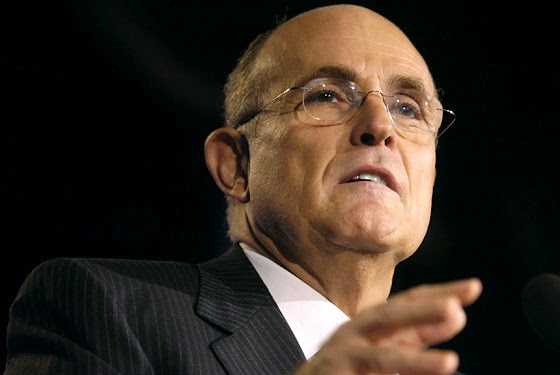Big Rudy would never have presented the Darren Wilson case to the Grand Jury. According to the former New York prosecutor and mayor, there wasn't enough evidence for an indictment, based on his pain-staking research, let alone a conviction of Wilson for even excessive force in this case.
Giuliani doesn't stop there, however, he condemns Black society as a culture of violence given its disproportionate murder rate as compared to any other ethic group in this country. Earlier on Meet the Press, the former mayor noted the high intraracial homicide rate of 93% among Blacks, saying that an outside police force was necessary to protect Blacks from each other.
He echoed those same sentiments in his latest harangue on Fox News, saying that "if I put all my police on Park Avenue instead of Harlem, thousands more Blacks would have died during my time in office." I guess you could call it "tough love." Big Rudy only had the best interests in the Black community in mind by beefing up police in their neighborhoods so that he could bring down the overall crime rate in the city, which he has long extolled as the greatest hallmark of his tenure as mayor of New York City.
One problem with Giuliani's assessment of the situation in Ferguson is that the intraracial homicide rate is pretty much the same across the board. Eight-five per cent of White homicides are committed by other Whites. By his logic, Black police should be called in to protect Whites form each other, even if the per capita homicide rate is significantly less.
Whether he meant to or not, Giuliani essentially promoted a plantation system of White police officers overseeing Black communities. He couched his argument by saying that he has only Black residents' better interests in mind, casting himself as the benevolent plantation owner.
It is precisely this kind of paternalism that has incensed Black communities, and why Republicans have struggled to cut into the Democratic hold of the Black vote. It's not that Blacks are particularly happy with the Democratic Party either, but at least they have far greater representation in the DNP and find themselves in far more leadership positions, including the current US Attorney General, Eric Holder, who continues to press the federal investigation into the shooting of Michael Brown.
Meanwhile, Darren Wilson has resigned from the Ferguson Police force, citing "credible threats" to himself and fellow officers in the wake of the Grand Jury decision. That maybe true as tension continues to run high in the city in the wake of this decision, but the problems that led to the shooting are ingrained in the police force, which is why there is a separate federal investigation into discrimination charges filed against the Ferguson Police Department.
No doubt, Big Rudy will continue to vent his opinion, bolstered by a conservative audience that largely sees the situation the same way he does. Inner cities have long been depicted as dens of Black crime, with corrupt local governments incapable of governing themselves, let alone provide the requisite security. Sadly, Rudy Giuliani has given into the conservative groupspeak, even made himself a spokesman based on his past experience, reinforcing these stereotypes.
What any of this has to do with the shooting death of an unarmed Black teenager is anyone's guess?

Comments
Post a Comment